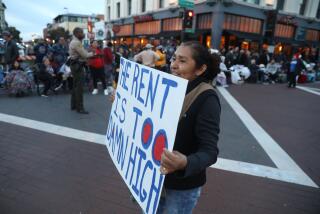Terminal Thirst in a Trickle-Down Era
- Share via
Like a lung cancer patient reaching for a pack of smokes, the Bush administration has greeted the latest run of gloomy economic news--a ballooning federal deficit, flagging consumer confidence, mounting unemployment--with a nerve-settling puff of its favorite brand of economic relief: tax cuts for the rich. Considering the imprudence of that idea, maybe the Bush team members are smoking something a little stronger than Marlboros.
According to the White House, the proposals being considered include tax incentives to encourage stock market investment and capital gains tax cuts--on top of the massive future tax cuts for the wealthiest Americans already signed into law. As Treasury Secretary Paul O’Neill said earlier this summer, “This is how we create economic prosperity--not by strangling people with interference and regulation and punishing restrictions on trade and job creation, but by opening the world up.”
In point of fact, deregulation and further tax cuts are the exact opposite of what the nation needs now.
How did the free-market ideology of the Reagan revolution come to be the political consensus of our times? How did we get suckered by the fairy tale that as long as people kept shopping, the market could keep prosperity growing as far as the eye could see? And that by voting with our credit cards we could spread the gospel of prosperous democracy to any corner of the Earth where American products were made or consumed. It’s time to acknowledge that this story doesn’t have a happily-ever-after ending.
Over the last 20 years, Americans have been doused with regular sermons on the supposed correlation between unregulated markets and higher standards of living. In the process, the American people were demoted from citizens to consumers and sold a bill of goods about how the almighty market was the essence of democracy. Accepted notions of public protections--of the environment, of workers, of the poor--were scrapped. The market worshippers shredded the modern social contract, the hard-fought consensus that had emerged since the New Deal and that ordered our political priorities, our communal concern for the most vulnerable and our disapproval of huge inequalities. We were now supposed to believe that all that could be left up to the soulless, self-correcting calculus of supply and demand. The free market had become the people’s market and would take care of us.
Once the province of Republican supply-siders, this all-encompassing faith was warmly embraced in the ‘90s by the New Democrats. And some old ones too. Even Jesse Jackson rang the opening bell at the New York Stock Exchange and created a Wall Street Project.
The media also did their part, hyping stories that made it seem as if everyone was making money investing. Who can forget the Beardstown Ladies, those bestselling, stock-pickin’ grannies supposedly making 23% returns in the market? Or those millionaires next door, such as the lowly government auditor who, by patiently investing in stocks, turned $5,000 into a $22-million fortune?
Stressed out about retirement? Your kids’ college tuition? A family health emergency? Not to worry! The market would take care of all that. Even being downsized could be made fun and profitable. After AT&T; laid off 40,000 workers in 1996, hedge-fund manager Jim Cramer wrote a cover story for the New Republic titled “Let Them Eat Stocks.” In it he proposed a simple solution. “Just give the laid-off employees stock options,” he exulted. “Let them participate in the stock appreciation that their firings caused.”
The future that Wall Street had dreamed of for decades--free of pesky regulators, snooping politicians and profit-sapping social activists--had arrived. It would take a while--and the fall of Ken Lay, Bernie Ebbers, Sam Waksal, et al.--before the invisible hand was exposed as a pickpocket. But even after the free-market parade had to be called off on account of fraud, not rain, we have begun to hear the trickle-down marching bands warming up in the distance.
It’s time we resuscitated Mark Russell’s definition of trickle-down as “something that benefits David Rockefeller now and Jay Rockefeller later.” Or, to be a bit more current, George Herbert Walker Bush then and George Walker Bush now.
More to Read
Get the L.A. Times Politics newsletter
Deeply reported insights into legislation, politics and policy from Sacramento, Washington and beyond. In your inbox twice per week.
You may occasionally receive promotional content from the Los Angeles Times.






